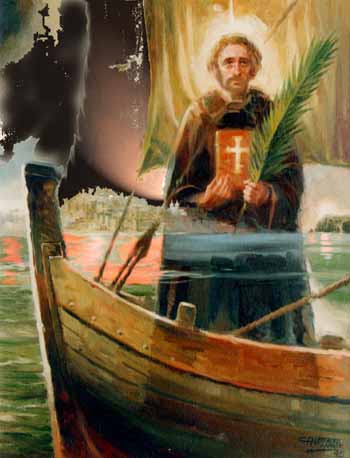
| ANTÓNIO VIEIRA |
|
O céu
'strella o azul e tem grandeza.
Este,
que teve a fama e à gloria tem,
Imperador
da lingua portugueza,
Foi-nos
um céu também.
No immenso
espaço seu de meditar,
Constellado
de fórma e de visão,
Surge,
prenúncio claro do luar,
El-Rei
D. Sebastião.
Mas
não, não é luar: é luz do ethéreo.
É um
dia; e, no céu amplo de desejo,
A madrugada
irreal do Quinto Império
Doira
as margens do Tejo.
|
|
Comentários: Este é um belíssimo poema de Mensagem que bem poderia ilustrar a afirmação de que a poesia de Fernando Pessoa é para ser compreendida e não explicada. A leitura transmite imediatamente, através de imagens suscitadas pelo texto, a visão do poeta. No entanto uma análise estritamente literal das frases individuais revelaria inesperadas complexidades. "imperador da lingua portuguesa"- epíteto dado por Pessoa ao Padre António Vieira que foi o maior orador do seu tempo e um dos mais admiráveis estilistas da prosa portuguesa. "surge, prenúncio claro do luar, El-Rei D.Sebastião"- refere-se aos escritos do Padre António Vieira sobre as esperanças de Portugal, que um grande rei conduziria a futuro Quinto Império do Mundo. "luz do etéreo"- luz celeste. |
|
NOTA: Os interessados poderão ler AQUI uma boa biografia do Padre António Vieira; e AQUI uma outra nota com referências ao ideal do Quinto Império de raiz portuguesa. Vieira deixou incompleto um livro em vários volumes a que deu o nome fantástico "História do Futuro" em que abordava a questão do Quinto Império. O livro está acessível na rede, bem como esta Tese sobre o tema. An introduction to the poem: Father Antonio Vieira's life spanned for most of the XVII century. Born during the period when the crowns of Portugal and Spain were united under a Spanish king, he was nevertheless an ardent nationalist. Educated and trained by the Jesuits, he served in Brazil where his quick mind and oratory gifts soon made him noticed. Following the 1640 Portuguese uprising against the Spanish rule, he sailed to Lisbon on a mission and subsequently became a trusted counselor of King John IV. His logical reasoning which he explained in simple words to enraptured crowds, both in Portugal and abroad, to whom he preached an egalitarian society under God (he himself was of mixed blood) eventually made him known as the most gifted preacher of his time. He is still considered as the grand master of Portuguese Prose, whence the epithet "Emperor of the Portuguese Language" bestowed upon him by Fernando Pessoa. Based on old prophecies that he interpreted in his own way and noticing the peculiar Portuguese intuition for easy dealings with people of all races, he postulated that Portugal was the Chosen Nation that would lead the world to an era of peace, understanding and union in the Christian Faith. This would be the Fifth Empire and the man who would make all this happen was "The Yearned-for", the new King Sebastian. In this respect, Pessoa was his "apprentice" and follower as visionary and theoreticist of the Portuguese Fifth Empire.
Father Antonio Vieira Heaven
spangles the blue and has splendour.
This man, who once had fame and now glory has,
Emperor of the Portuguese language,
Was to us a heaven too.
In his wide expanse of meditation,
Constellated with form and with vision,
Rises, clear harbinger of moonlight,
King Don Sebastian.
But no, 't is not moonlight: 't is light ethereal.
'T
is a day, and, in the sky ample with desire,
The
unreal dawning of the Fifth Empire
Gilds
the banks of the Tagus.
|